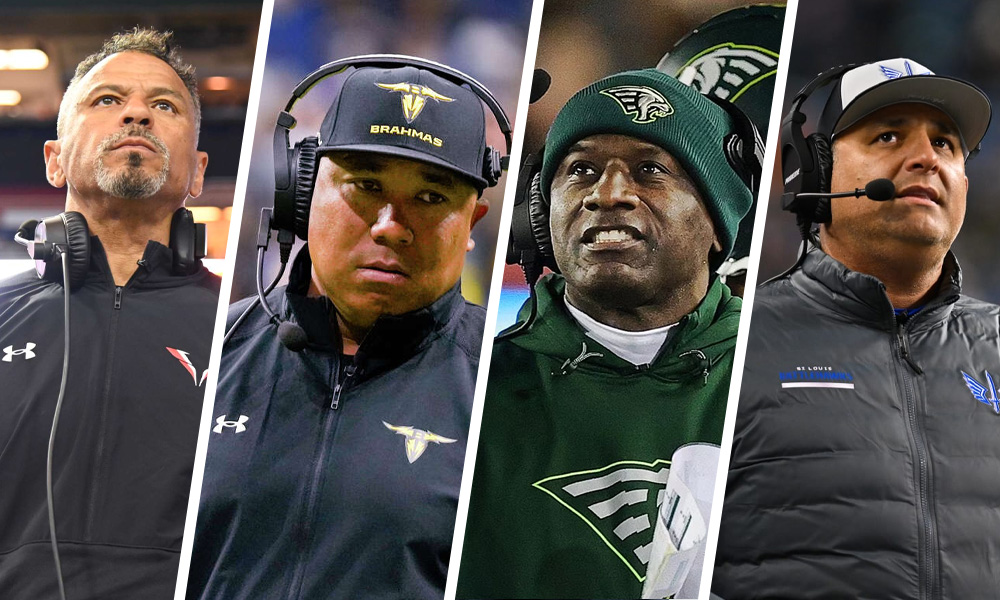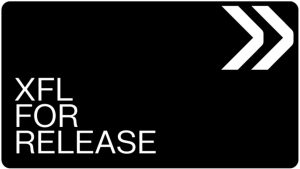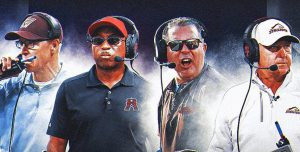
The XFL offers itself up as the league of opportunity. That opportunity extends beyond the players: When the league hired its head coaches last year, management made the conscious decision to bring aboard four men that had no prior head coaching experience. Not only that, those four had never been coordinators in college or the pros, and even their position coach resumes were thin. All of them would tell you they hadn’t been given a fair shot, passed over for one reason or another within the coaching profession.
There was an expectation by most observers that these first-time head coaches would struggle out of the gate. The results, however, were stark: None of the four teams helmed by these coaches made the playoffs, and they finished the season with a combined record of 13-27 (with seven of the wins coming from Anthony Becht’s St. Louis Battlehawks). One of those coaches, Rod Woodson of the Vegas Vipers, will not return in 2024. He was replaced last Friday by Anthony Blevins, who enters the league as another first-time head coach and while he has almost two decades of college and NFL coaching experience, all of his time at the pro level has been as an assistant position coach.
Each coach’s situation in 2023 was different, and none of their failures can be pinned solely on their lack of preparedness for the job. But digging into their performances both on and off the field this past year shows major strides may need to be made in 2024 for the majority of them to retain their jobs beyond that point (XFL News Hub’s Mike Mitchell has reported head coaches are on two-year contracts).
There are two ways to judge any coach, and that’s by how they conduct themselves off the field, and their team’s performance on it. The latter is relatively easy to judge: What’s the team’s record? How do they rank on offense and defense? Are the players playing with consistent effort? The former is something we may never be privy to.
It’s hard enough to deal with the thousands of in-game decisions that need to be made as a head coach. The XFL has made it more difficult, however, by tweaking the rules to require coaches to make even more decisions than in a college or NFL game. The tiered extra points provide an additional layer of decision-making after touchdowns. The “golden challenge” forces coaches to be even more astute about what plays to have head of officiating Dean Blandino look at – they don’t have the outsized staffs to rely on someone whose sole job is to tell the head coach when to challenge, and in the XFL, you can challenge anything. All of these decisions need to be made with a running game clock and a shorter play clock, expediting the mental process. It’s not an environment that is welcoming to the kinds of first-time head coaches the XFL sought. With preseason games cancelled due to inclement weather in Arlington, the coaches didn’t even have a dry run for these kinds of situations.
Behind the scenes, there are a variety of issues a head coach must deal with that speak to the grind of the profession. From creating practice schedules, to interviews with the media, to setting the tone of the locker room, to being available 24/7 to meet the needs of your players, to managing not only the coaching staff but the equipment managers, video coordinators, and all others associated with every aspect of the team, head coaches have many responsibilities that go beyond the football field. In the XFL, given the lack of scouting departments for each team, head coaches also play the role of de facto scout, breaking down film to assist the directors of player personnel in procuring players.
Some people have an innate ability to handle these duties with little preparation; by and large, though, it’s why there is a metaphorical ladder in the coaching profession that one must climb before reaching the top job, no matter what the level. With experience, you’re able to build your notebook, taking something from every stop and every head coach you’ve worked for. While these four XFL coaches have extensive playing careers playing for some of the best NFL head coaches of all-time, it’s different when you take off the helmet and YOU’RE in charge.
Woodson appears to be the only head coach who will not make it to year two. While the XFL put out a press release, buried at 11:30 pm EST on a Sunday night, claiming the move was a mutual decision between Woodson and the league, there’s reason to be skeptical of that. On a Springball Boulevard podcast with Matty Fresh in the immediate aftermath of the news breaking, Mike Mitchell mentioned that XFL brass had “soured” on Woodson and that “the league wasn’t too happy with his performance overall.” It’s possible the XFL allowed Woodson to save face by terming his exit as a mutual decision.
As far as on-field, the Vipers finished the season 2-8, a record that speaks for itself. Woodson and director of player personnel Joey Clinkscales built the team on big-name acquisitions such as Martavis Bryant and Vic Beasley, but the results were mixed at best. The team and the league allowed offensive coordinator Duane Taylor to finish out the 2022 collegiate season in the same position at Alabama A&M before he was officially brought on board; while it’s nice to accommodate coaches, this was certainly an unusual move. It was made all the more strange when Woodson dismissed Taylor from the staff after just three games. The results post-Taylor were not significantly better: The team averaged 17.3 points per game under Taylor, 18.9 points per game without him.
The handling of the quarterback situation throughout the year also raised questions about Woodson and his staff’s evaluative process. Despite signing NFL veteran Brett Hundley in January, the team chose to start Luis Perez to begin the season. Injuries and ineffectiveness led to Vegas volleying back-and-forth between those two for much of the year. When Perez requested a trade mid-season, Vegas obliged, sending him to Arlington where he’d later lead the team to the XFL Championship. Rather than turning to Hundley, Vegas opted for third-stringer Jalan McClendon in part to see what McClendon had to offer for the 2024 season, even though their slim playoff hopes were still alive at that point. McClendon won his first game, but finished 1-3 as a starter. Woodson made the move to McClendon for a 2024 season he now won’t be around to pilot.
Vegas had the lead or was tied in seven of their 10 games, but were outscored in the second half 160-90. The inability to make halftime adjustments, as overrated as some believe them to be, falls squarely on the coaching staff. These decisions or lack thereof reflect poorly on Woodson, but it’s unlikely they cost him his job.
One aspect that may have hampered team performance but cannot be blamed on the coaches was the Vegas stadium situation. While others had a true home-field advantage, the Vipers were forced to play in a converted minor league baseball stadium that lacked the amenities and atmosphere of other home fields throughout the league. All signs point to Vegas returning to Cashman for 2024.
A combination of poor on-field results and a costly mishandling of an off-field situation led some to speculate Orlando Guardians head coach Terrell Buckley might not even make it through the end of the season. His Guardians finished 1-9, the worst team in the league, with a roster that was not up to par with others in the XFL. The difficulty they had, then, was not much of a surprise.
Perhaps more surprising was Buckley’s handling of the team. Most notably, his initial decision to release QB Quinten Dormady when word reached him that Dormady had shared the team’s playbook with a member of the San Antonio Brahmas, rather than investigate the accusations or speak to Dormady personally about the situation. In fact, according to a story in The Athletic, it was tight ends coach Brett Johnson who informed Dormady he was being released, rather than Buckley himself.
Eventually, Dormady was cleared of any wrongdoing and rejoined the Guardians, but the hit to the reputation of Dormady as well as the league itself, not to mention the monetary cost to the league of the investigation and settlement with Dormady, could’ve been avoided had the Orlando staff looked deeper into the charges before letting Dormady go. The perceived fumbling of the situation by Buckley, in addition to the team being outclassed each week on the field, is what led some to speculate that Buckley’s job could’ve been in peril early on.
For the most part, once Dormady took over as starting quarterback, the team was more competitive. Unlike in Vegas, a change made to offensive play-calling duties, from offensive coordinator Robert Ford to quarterbacks coach Shane Matthews, bore fruit: Orlando’s scoring offense doubled in the final six games with Matthews calling plays. The team’s one win was a memorable upset of the then-undefeated DC Defenders, who would go on to play in the league’s championship game. Orlando ended the season on a low note, however, with a 53-28 drubbing at the hands of the St. Louis Battlehawks in a week 10 game where the defense frequently seemed disinterested.
Buckley’s sideline demeanor drew criticism as well. He often let his emotions get the best of him, the most notable example coming in the midst of a 30-12 loss to the San Antonio Brahmas in week two, where he admitted to ESPN’s sideline reporter that he needed to get different players because the ones in the game were not competing to his liking. Soundbites like that make for good television, but can cause players to lose confidence in a coach.
Buckley returns in year two – he’s already been spotted at one of the XFL’s Showcase events – but his staff isn’t likely to return intact. He mentioned to the Orlando Sentinel that there will be some coaching changes within the team and potentially a roster overhaul as well. If nothing else, Buckley seems to be saying the right things heading into an important year two for him and the Guardians; whether he’s able to successfully implement those changes remains to be seen.
More than any other head coach, it was difficult to get a read on Hines Ward’s performance given the sheer amount of injuries he had to deal with. The San Antonio Brahmas finished the season with more players on injured reserve than any other team in the league. Twenty-one of the players on the final 51-man roster did not begin the season with the Brahmas. Notably, injuries struck the most important positions on the team, quarterback and offensive line. It made Ward’s offense anemic for the majority of the year – the Brahmas finished last in both rushing yardage and passing yardage.
The team’s starting offensive line combined to miss a total of 21 games, with only center Luke Juriga playing in all 10. San Antonio started four different quarterbacks, with Kurt Benkert and Reid Sinnett both finishing the season on IR. Starter Jack Coan was shut down for two games due to an ankle ailment. San Antonio’s poor injury luck was exemplified in a practice prior to week six, when Coan and starting RB Kalen Ballage (torn Achilles) suffered serious injuries on back-to-back plays.
Among the positives were the Brahmas’ defense and special teams, both in the conversation for best in the XFL in 2023. Ward had his team in the playoff hunt deep into the season despite finishing with a 3-7 record. A missed Parker Romo 53-yard field goal that would’ve won them the game against DC in week 10 is all that stood between them and a postseason berth.
A profile of Ward in The Athletic in May points to just how hungry he is to get back at it in year two. Staff changes may be afoot – Ward demoted offensive coordinator Jaime Elizondo to receivers coach and elevated running backs coach Jimmie Johnson to play caller prior to week five – but none have been announced as of yet. Unlike with Woodson and Buckley, there didn’t seem to be any off-field concerns when it came to how Ward handled the job, which bodes well for his potential for success in year two.
The outlier among this group of head coaches was Anthony Becht of St. Louis. Becht had the Battlehawks on the doorstep of the playoffs, with divisional seedings the only thing keeping them out of the hunt for the XFL Championship. He seemed to push many of the right buttons during the season and his enthusiasm rubbed off on his players and the eager fanbase.
In assembling his staff, many expected Becht to rely heavily on experienced coaches given his own inexperience. Instead, he went against the grain and named Donnie Abraham defensive coordinator and Bruce Gradkowski offensive coordinator. Most of Abraham’s coaching experience has been at the high-school level with only three years in the pros as defensive backs coach. Gradkowski’s resume is even thinner. Both units performed well enough to guide St. Louis to a 7-3 record.
Even Becht’s controversial on-field and personnel decisions seemed to work out. In a week eight game against Vegas with playoff implications, Becht held star QB AJ McCarron out of the game due to an injury, even though McCarron felt he could’ve played. Instead, untested backup Nick Tiano was given the start. He led the team to a 21-17 overtime victory that kept the Battlehawks in the playoff hunt.
The one blemish on Becht’s record in 2023 was the team’s head-to-head matchup with the Seattle Sea Dragons in week nine. A win would’ve put St. Louis in the playoffs, and it was a game they played at home in front of more than 35,000 fans. Despite all the team had going for it, they came out flat and were outplayed and outcoached in a 30-12 loss. In the end, the loss cost them a playoff berth.
When writing in December about the trend of hiring head coaches with little coaching experience, both in the XFL and elsewhere in football, I wrote, “Being a head coach isn’t about diagramming plays or teaching technique. It’s about being a leader of men, about building a culture, and about being an effective communicator. Sometimes, those qualities come from unexpected places.” You can add one more to the list of what being a head coach is about: Overcoming adversity.
Each one of these coaches and teams will need to overcome the adversity they faced in 2023, whether it was injuries (Brahmas), poor play (Guardians), not making the playoffs despite a good record (Battlehawks) or their stadium situation and coaching change (Vipers). How these coaches are able to respond to the adversity they faced in 2023 in attempting to right the ship in 2024 will go a long way in determining their individual and team success next season and beyond.













